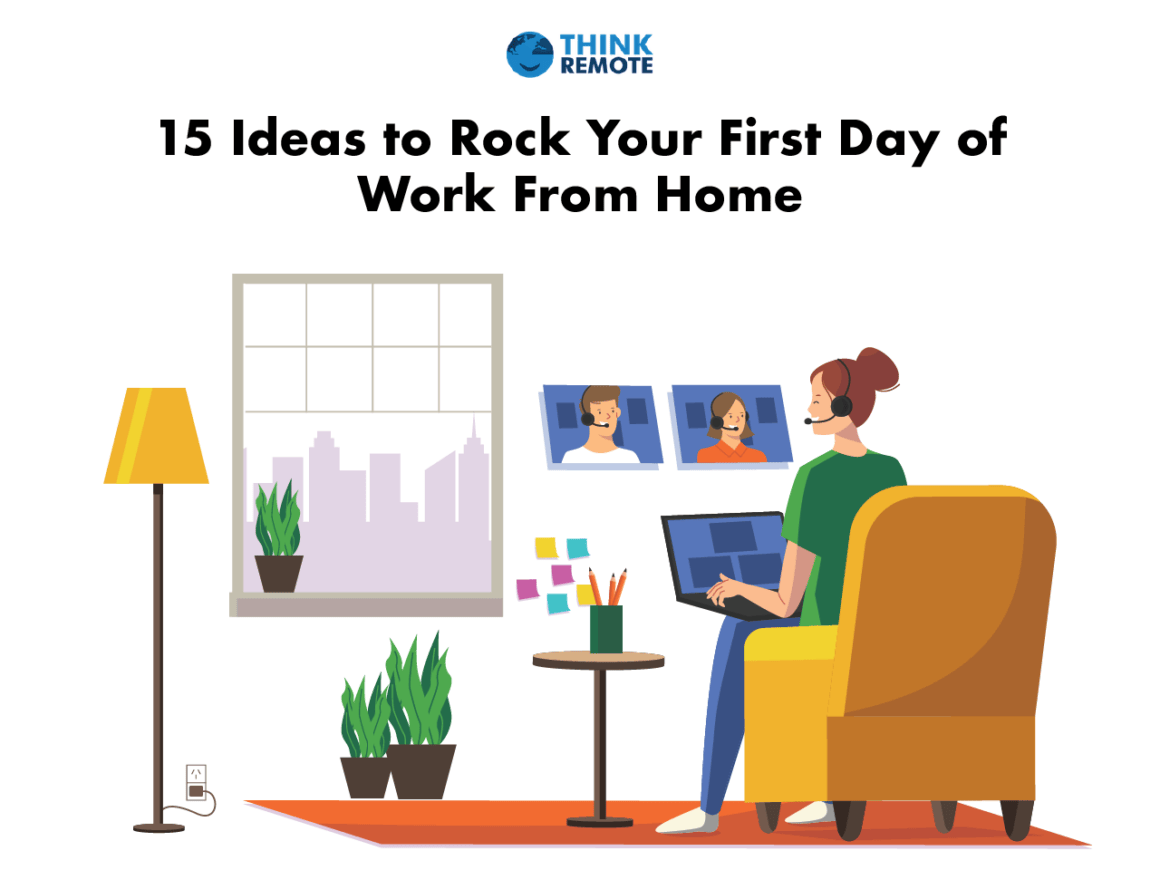Congratulations, you survived the interviewing process and landed a remote job! Your first day of work is coming up soon. And while you’re happy about this new opportunity, let’s face it, you’re probably feeling nervous too.
Don’t worry; it’s completely normal. You have certain expectations, and you want to make a good impression. So, how to succeed during this first day?
We got you covered with 15 ideas to help you start your new role in the best way possible.
15 Ideas to Prepare for Your First Day at Work

My first formal job was remote. I never had the office experience, so I wasn’t really sure what to expect from the remote work experience either. But, I remember my first day as if it was yesterday.
Here are some of the tips I wish I had known back then:
1. Prepare Your Home Office
Being a remote worker means you need certain tools to do the job; A good computer, a pair of headphones, a second monitor (in some cases), an ergonomic chair for your posture, etc.
During the first months, it’s normal to work with what we have, which usually means headphones and a laptop. With time you´ll realize that a bigger desk makes sense or that you need a different chair.
However, what does matter is having a designated office space. This will give you the feeling of “whenever I´m here, I know I have to work,” It helps you increase productivity and focus. The day before your first day at a new job, try building a designated space with things that you like. Plants, cute decorations, a family picture, whatever makes you feel more motivated!
2. Learn to Use the Tools/Applications You´ll Be Using
Not everyone learns the same way how to use applications. And, not every application has the same difficulty level. The biggest mistake is expecting to learn everything on the first day.
If your boss already mentioned what tools you´d be using, experiment with them a bit.
Have everything downloaded, and see how each tool works. For example, learn the basics of Zoom, like how to turn on/off the camera or microphone, share a screen, or change your background.
If you see a tool is challenging, then you´ll know what questions to ask during the first day or in what areas you´ll need more help.
3. Introduce Yourself to Your New Team
When a new employee joins, some companies make welcome video calls or virtual events. Others welcome them with a simple message, and others don´t do anything. Whatever your case is, find a way to introduce yourself to the team.
If you talk by Slack, you can message your team, telling them who you are, what your role will be, and how excited you are about being on the team.
For example:
“Hi, I´m Gabriela, the new content marketer. I´m excited to join the team and to meet everyone!”
4. Set Clear Expectations with Your Boss
If you aren´t sure what your role is or what are the results your boss expects to see during the first month, don´t try guessing. Be direct and ask them.
During your first day on the job, you´ll probably have a 1-1 with your boss where you´ll learn what your tasks and responsibilities will be. If you don´t, it would be a good idea to ask them to schedule one.
This way, you get to start on the right foot, knowing exactly what is expected of you. It’s easy to reach out to the goals when you know what the goals are.
5. Create a Schedule
This is something I wish I had known. Not trying to be dramatic, but having a schedule would´ve saved me from overworking, stress, and eventually burnout.
Having a remote job means having more flexibility. Which sounds (and is) amazing but is also a double-edged sword. Mainly because you feel you have so much time and can arrange your activities the way you want to, and then realize that either everything has accumulated and you have a ton of work to do, or you are getting too distracted.
A schedule helps you optimize your time so much. With time, you start working faster and having more time to do things you truly enjoy. In other words, it helps you organize your day and, eventually, to build a great work-life balance.
6. Don´t Be Afraid to Ask
Has it ever happened to you that someone is passionately explaining something, and you just can´t understand a word they´re saying? You’re basically staring at them like:

It’s your first day on the job, so you want to seem as if you know everything, right? But, sometimes, the know-it-all strategy is a bad idea. Your boss and colleagues know you´re still learning how the team dynamic works, and they expect you to have questions. Now it’s your chance to ask as many questions as you want.
Imagine not asking anything and three months later collapsing over the basic things!
7. Organize Your Tasks
One thing is creating a work-from-home schedule, and another thing is organizing your workday. Depending on the company and team you work for, you´re likely to use project management applications that do the work for you, telling you your assignments, due dates, and more.
But, despite having these great tools, it’s always best to have your own to-do list. I started the old school way, with a physical agenda which at the beginning worked for me, but then I realized that so many apps make it even easier.
Nowadays, I use One Note. But others such as Todoist and Notion are a great option.
8. Create a Morning Routine
Having a morning routine is way too underrated.
Most of us hear our alarms and immediately check our phones and emails, and in just a matter of minutes, we already become stressed.
Every. Single. Day.
Instead, try doing a pre-work routine. If you like to meditate, you could start your day with a couple of minutes just for yourself. Same with exercise or reading a book you enjoy. Doing an activity that stimulates you will help you clear your mind and prepare for your day. Then make time to take a shower without rushing, wear something comfortable, and eat a powerful breakfast.
9. Take Breaks!
In your first week, you´ll feel this need to make everything perfect and to work every possible second. But this only leads to quick burnout.
When creating your schedule, make sure you keep breaks into account. According to Psychology Today, working for extended periods leads to stress and exhaustion. Breaks help you refresh your mind and become more productive.
10. Get Comfortable with the Camera

Sometimes the idea of having a camera on seems like a nightmare. But it’s important, especially in fully remote teams, as it’s only your face-to-face connection with your colleagues.
While for some companies, videos are mandatory during meetings, in other cases, they are not. This makes it tempting for employees to leave them off, but this also makes them not be fully invested in the meeting. Having the camera on helps you stay focused and present.
Initially, it can feel uncomfortable if you´re not used to it, but it’s just a matter of time.
11. No PJs!
One of the most important first day of work tips as a remote worker is this one: Don´t wear pajamas. It makes you lazier because when you put on your PJs, your brain associates it with sleeping or relaxing.
You don´t need to dress formally in clothes you would wear at work either unless you want to. But, the best way to go is to wear comfortable clothes.
During your first day, if you´re feeling extra nervous, you could wear something that makes you confident.
12. Embrace Virtual Water Coolers From the Start
Virtual water coolers are those activities remote companies do to strengthen the culture and relationships between employees. Maybe a virtual happy hour or a scavenger hunt game!
In many cases, these activities are optional, and it might be tempting to avoid them and do other things. But, if you´re new to the company, being there will help you network and build friendships, which is fundamental when you´re a remote worker.
13. Create Your WFH Playlists!
Like coffee in the morning, music can give you the energy boost you need on those days when you feel tired or unmotivated.
I learned how powerful WFH playlists could be. I have different playlists for different tasks. For example, when I´m doing a task that requires a lot of concentration, I usually go for Lofi music; this is my favorite YouTube channel (which I highly recommend).
But, when I don´t need to be so focused, I love listening to music that makes me happy. I created my own playlist to give me an energy boost whenever I´m feeling lazy.
14. Identify Your Energy Levels Through the Day
Ok. Yes, this might seem weird, but it works like a charm. It helps you learn what times of the day you´re most productive.
You’ll probably not identify this on your first day at work yet, but with weeks you can start tracking at what times you work best.
For example, If you work better during the mornings, you can focus the tasks that require the most out of you and leave the others during the afternoon. This is a simple but effective way to become more productive and optimize your time.
15. Be Kind to Yourself
Your first day can be overwhelming. You need to learn many things, some of which can be challenging. So don’t be hard on yourself. If you didn’t accomplish every to-do on your list, there are more days to come. You don’t need to start off perfect; what matters is that you improve with time. And this will only be possible with experience and learning from your mistakes.
It’s All About the Attitude
Stay positive!
Even if you don’t fulfill your first day of work expectations, believe in yourself and that you have everything that it takes. You have the job; now its just a matter of time to become better at it. It’s all about having the right attitude and the disposition to learn and improve what will make you succeed.







